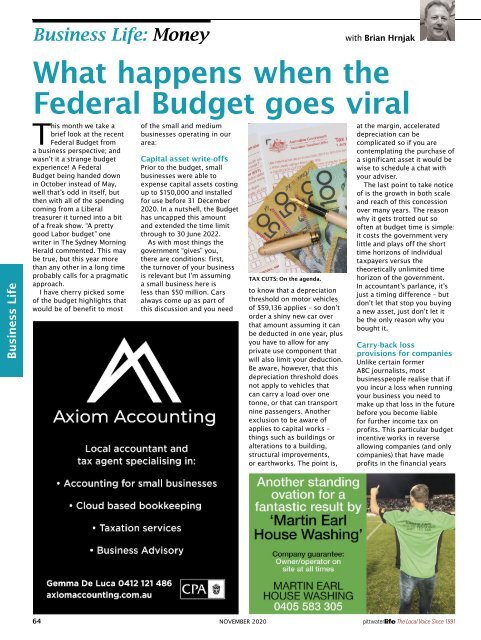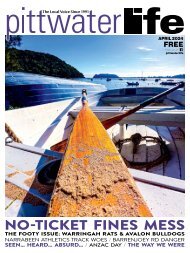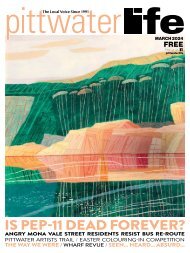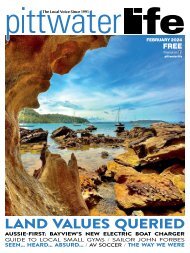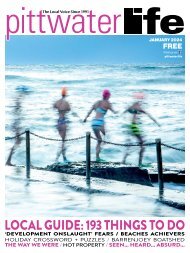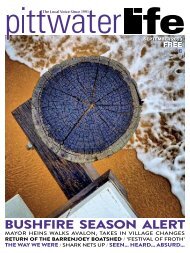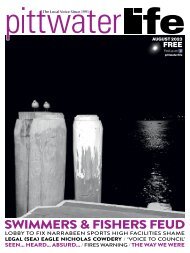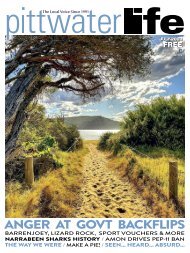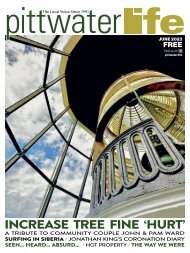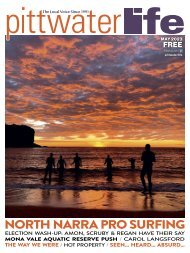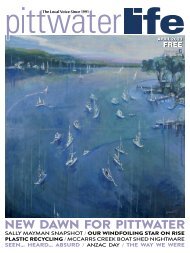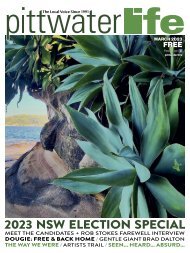Pittwater Life November 2020 Issue
FEARS FOR ‘COVID AMBASSADORS’ 1980 FLASHBACK: REMEMBERING THE FIRST AVALON VILLAGE FAIR SWELL CHASER: HOW TIM BONYTHON BECAME A BIG WAVE FILM MAKER LATEST COUNCIL NEWS / SUMMER SAILING / SEEN... HEARD... ABSURD...
FEARS FOR ‘COVID AMBASSADORS’
1980 FLASHBACK: REMEMBERING THE FIRST AVALON VILLAGE FAIR
SWELL CHASER: HOW TIM BONYTHON BECAME A BIG WAVE FILM MAKER
LATEST COUNCIL NEWS / SUMMER SAILING / SEEN... HEARD... ABSURD...
You also want an ePaper? Increase the reach of your titles
YUMPU automatically turns print PDFs into web optimized ePapers that Google loves.
Business <strong>Life</strong>: Money<br />
with Brian Hrnjak<br />
Business <strong>Life</strong><br />
What happens when the<br />
Federal Budget goes viral<br />
This month we take a<br />
brief look at the recent<br />
Federal Budget from<br />
a business perspective; and<br />
wasn’t it a strange budget<br />
experience! A Federal<br />
Budget being handed down<br />
in October instead of May,<br />
well that’s odd in itself, but<br />
then with all of the spending<br />
coming from a Liberal<br />
treasurer it turned into a bit<br />
of a freak show. “A pretty<br />
good Labor budget” one<br />
writer in The Sydney Morning<br />
Herald commented. This may<br />
be true, but this year more<br />
than any other in a long time<br />
probably calls for a pragmatic<br />
approach.<br />
I have cherry picked some<br />
of the budget highlights that<br />
would be of benefit to most<br />
of the small and medium<br />
businesses operating in our<br />
area:<br />
Capital asset write-offs<br />
Prior to the budget, small<br />
businesses were able to<br />
expense capital assets costing<br />
up to $150,000 and installed<br />
for use before 31 December<br />
<strong>2020</strong>. In a nutshell, the Budget<br />
has uncapped this amount<br />
and extended the time limit<br />
through to 30 June 2022.<br />
As with most things the<br />
government “gives” you,<br />
there are conditions: first,<br />
the turnover of your business<br />
is relevant but I’m assuming<br />
a small business here is<br />
less than $50 million. Cars<br />
always come up as part of<br />
this discussion and you need<br />
TAX CUTS: On the agenda.<br />
to know that a depreciation<br />
threshold on motor vehicles<br />
of $59,136 applies – so don’t<br />
order a shiny new car over<br />
that amount assuming it can<br />
be deducted in one year, plus<br />
you have to allow for any<br />
private use component that<br />
will also limit your deduction.<br />
Be aware, however, that this<br />
depreciation threshold does<br />
not apply to vehicles that<br />
can carry a load over one<br />
tonne, or that can transport<br />
nine passengers. Another<br />
exclusion to be aware of<br />
applies to capital works –<br />
things such as buildings or<br />
alterations to a building,<br />
structural improvements,<br />
or earthworks. The point is,<br />
at the margin, accelerated<br />
depreciation can be<br />
complicated so if you are<br />
contemplating the purchase of<br />
a significant asset it would be<br />
wise to schedule a chat with<br />
your adviser.<br />
The last point to take notice<br />
of is the growth in both scale<br />
and reach of this concession<br />
over many years. The reason<br />
why it gets trotted out so<br />
often at budget time is simple:<br />
it costs the government very<br />
little and plays off the short<br />
time horizons of individual<br />
taxpayers versus the<br />
theoretically unlimited time<br />
horizon of the government.<br />
In accountant’s parlance, it’s<br />
just a timing difference – but<br />
don’t let that stop you buying<br />
a new asset, just don’t let it<br />
be the only reason why you<br />
bought it.<br />
Carry-back loss<br />
provisions for companies<br />
Unlike certain former<br />
ABC journalists, most<br />
businesspeople realise that if<br />
you incur a loss when running<br />
your business you need to<br />
make up that loss in the future<br />
before you become liable<br />
for further income tax on<br />
profits. This particular budget<br />
incentive works in reverse<br />
allowing companies (and only<br />
companies) that have made<br />
profits in the financial years<br />
64 NOVEMBER <strong>2020</strong><br />
The Local Voice Since 1991<br />
between 1 July 2018 and 30<br />
June 2021 to obtain a refund<br />
against losses they have<br />
incurred between 1 July 2019<br />
and 30 June 2022.<br />
The reason why only<br />
companies are eligible is<br />
that this refund is generated<br />
against the company’s<br />
franking credit account and<br />
the scale of any refund is<br />
limited to the balance of the<br />
franking account and cannot<br />
create a deficit. Companies<br />
that clean out their franking<br />
accounts will need to make<br />
profits and pay company<br />
tax in the future before<br />
they can go onto to pay<br />
franked dividends to their<br />
shareholders.<br />
Personal Tax Cuts<br />
I won’t bore you with the<br />
rundown of the brackets but<br />
The Sydney Morning Herald<br />
quoted some post-budget<br />
analysis from the BankWest<br />
Curtin Economics Centre<br />
that around three quarters of<br />
Australians will be better off<br />
as a result of the combination<br />
of brought forward tax cuts,<br />
extension of low and middle<br />
income offsets, two $250<br />
payments to pensioners and<br />
the Corona Virus supplement<br />
paid to those on JobSeeker<br />
benefits.<br />
More importantly for<br />
business owners, in the week<br />
following the Budget the<br />
Herald went on to report a<br />
strong jump in the regular<br />
Westpac survey of consumer<br />
confidence to a two year high<br />
that economist Bill Evans<br />
described as “extraordinary”<br />
and attributed to the<br />
Budget as well as improving<br />
containment of the virus.<br />
When tax planning this<br />
financial year, it would pay to<br />
keep an eye on the thresholds<br />
of $45,000 and $120,000 as<br />
these are the points that mark<br />
the start of new tax brackets<br />
as well as the end point of tax<br />
offsets. For example, salary<br />
sacrificing superannuation on<br />
an income of $45,000 is no<br />
longer economic when you<br />
consider the average rate of<br />
income tax combined with tax<br />
offsets – you’d be better off<br />
taking the funds as wages.<br />
The tax cuts contained<br />
The Local Voice Since 1991<br />
in the budget have been<br />
backdated to 1 July and<br />
legislated so they will<br />
manifest themselves as lower<br />
PAYG withholding for most<br />
businesses when they prepare<br />
their BAS. The tax offsets<br />
should any apply will become<br />
available when an individual<br />
lodges their 2021 tax return.<br />
JobMaker Hiring Credit<br />
This is an age-based hiring<br />
credit for new employees<br />
engaged for 20 or more hours<br />
per week who were previously<br />
on JobSeeker, Youth Allowance<br />
or Parenting Payment. Paid at<br />
the rate of $200 per week for<br />
those aged 16 to 29 and $100<br />
per week for those aged 30<br />
to 35, the concession is for<br />
12 months from the date of<br />
employment.<br />
Apprenticeships<br />
wage subsidy<br />
From 5 October <strong>2020</strong> to 30<br />
September 2021, businesses of<br />
any size will be able to claim<br />
a Boosting Apprentices Wage<br />
Subsidy for new apprentices<br />
or trainees who commence<br />
during this period. Employers<br />
will be reimbursed up to 50%<br />
of an apprentice or trainee’s<br />
wages up to $7,000 per<br />
quarter subject to a national<br />
cap of 100,000 places.<br />
The government may have<br />
wanted to splash around<br />
the word ‘apprenticeship’<br />
in the budget papers but<br />
a quick look around at the<br />
traineeships on offer shows<br />
there is a strong diversity of<br />
training available in nontrades<br />
areas such as office<br />
work that should mean the<br />
scheme is well supported.<br />
Brian Hrnjak B Bus CPA (FPS) is<br />
a Director of GHR Accounting<br />
Group Pty Ltd, Certified<br />
Practising Accountants. Offices<br />
at: Suite 12, Ground Floor,<br />
20 Bungan Street Mona Vale<br />
NSW 2103 and Shop 8, 9 – 15<br />
Central Ave Manly NSW 2095,<br />
Telephone: 02 9979-4300,<br />
Webs: www.ghr.com.au and<br />
www.altre.com.au Email:<br />
brian@ghr.com.au<br />
These comments are of a<br />
general nature only and are<br />
not intended as a substitute<br />
for professional advice.<br />
NOVEMBER <strong>2020</strong> 65<br />
Business <strong>Life</strong>


